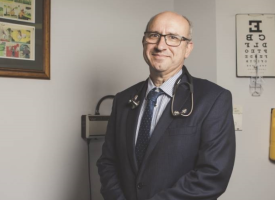PHNs – an opportunity to provide GP-led support for quality primary care service delivery
From today, 31 new Primary Health Networks (PHNs) start work across the country, replacing the former Government's Medicare Locals.
AMA President, Professor Brian Owler, said today that the AMA has always acknowledged the importance of a network of primary health organisations to facilitate improved patient access to primary care services, but Medicare Locals had been patchy at best in delivering the results promised by the former Government.
“The PHNs provide an opportunity for a fresh start to support consistent high-quality primary care services across the country,” Professor Owler said.
“We cannot afford another Medicare Local-style failure, so it is critical that PHNs better target services and recognise the central role of general practice in the delivery of primary care services.
“With many PHNs in the early stages of their development, they have a great opportunity to get their structure, processes, and services right.”
The AMA believes that PHNs should focus on the following areas:
- Population Health
Identifying community health needs and gaps in service delivery; identifying at-risk groups; supporting existing services to address preventive health needs; and coordinating end of life care.
- Building General Practice Capacity
Supporting general practice infrastructure to deliver quality primary care through IT support; education and training of practices and staff; supporting quality prescribing; training and supporting the use of e-Health technology and systems; and facilitating the provision of evidence-based multidisciplinary team care.
- Engaging with Local Hospital Networks/Districts
Identifying high risk groups and developing appropriate models of care to address their specific health issues (e.g. those at high risk of readmissions, including noninsulin-dependent diabetes mellitus, congestive cardiac failure, chronic obstructive pulmonary disease, and other chronic diseases); and improving system integration in conjunction with local health networks.
Professor Owler said the evidence from countries such as New Zealand shows that GP leadership and input is vital for PHNs to be effective.
“GPs are generally the first point of call in the health system,” Professor Owler said.
“They can provide high quality clinical input as well as first-hand knowledge of where improvements in the health system need to be made.
“Not only should GPs be included in Clinical Councils, they should also participate at all levels of governance, including on the PHN Boards.
“There is a great deal of goodwill in the profession to make PHNs work well for patients and local communities.
“The AMA stands ready to work with the Government to ensure that PHNs are an effective and integral component of the health system,” Professor Owler said.
1 July 2015
CONTACT: John Flannery 02 6270 5477 / 0419 494 761
Odette Visser 02 6270 5412 / 0427 209 753
Follow the AMA Media on Twitter: http://twitter.com/ama_media
Follow the AMA President on Twitter: http://twitter.com/amapresident
Follow Australian Medicine on Twitter: https://twitter.com/amaausmed
Like the AMA on Facebook https://www.facebook.com/AustralianMedicalAssociation



